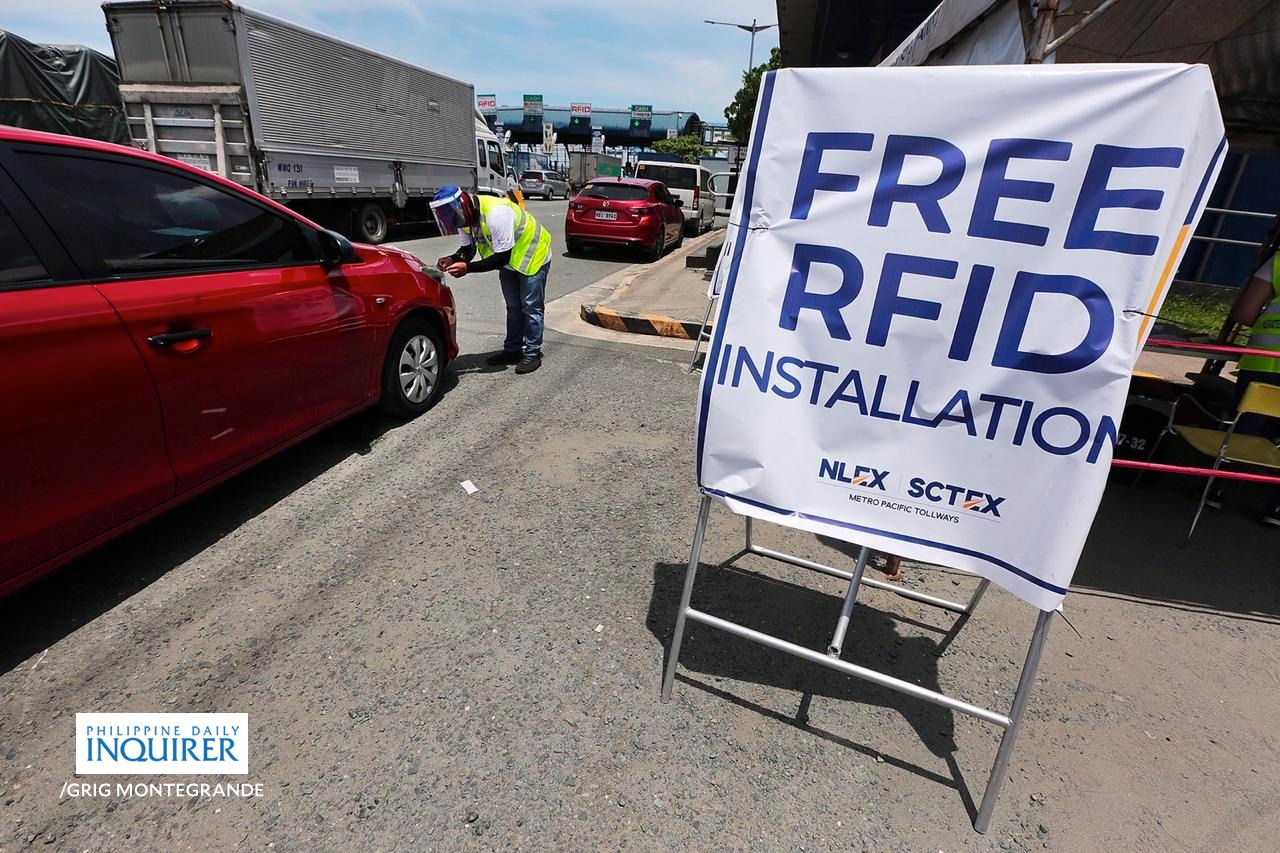
Motorists line up to have RFID stickers installed on their vehicles at the Balintawak Toll Plaza Customer Service Center parking area —Inquirer file photo/Grig C. Montegrande
MANILA, Philippines — A trade union has called on President Ferdinand Marcos Jr. to stop transport authorities from implementing by Aug. 31 what it called a “discriminatory and antipoor” policy penalizing motorists who have no radio-frequency identification (RFID) stickers or who do not have enough RFID load at tollgates of expressways.
The Federation of Free Workers (FFW) said Joint Memorandum Circular (JMC) No. 2024-001 of the Department of Transportation, Land Transportation Office and Toll Regulatory Board (TRB) effectively downgrades the importance of the legal tender law by making it punishable to pay cash at tollways.
READ: Colmenares describes RFID fines as ‘nothing short of highway robbery’
“FFW humbly and strongly recommends to President Ferdinand Marcos Jr., as having control and jurisdiction over all government agencies in the executive department, [that he direct] the TRB to return this memo to the drawing board for a thorough review, or better yet, throw it into the garbage can,” FFW vice president Jun Mendoza Ramirez said in a statement on Sunday.
“This policy is not only punitive but also discriminatory, especially toward provincianos who may not frequently use tollways or only travel to the metropolis once in a blue moon,” he added.
Under the JMC signed on Aug. 1 and published on Aug. 16, motorists must apply for an electronic toll collection device like an RFID tag, attach it to their vehicles, and ensure that their accounts have enough balance to pay their toll and other fees.
A motorist entering a tollway’s dedicated Electronic Toll Collection (ETC) lanes with no valid ETC device, such as an RFID sticker, shall be fined P1,000 for the first offense, P2,000 for the second offense, and P5,000 for succeeding offenses.
Meanwhile, a motorist leaving the toll expressway with insufficient balance shall be fined P500 for the first violation, P1,000 for the second violation and P2,500 for succeeding violations.
“The TRB memo penalizes practicality. Motorists who use their vehicles sparingly to save money should not be punished for occasionally forgetting to load their RFID. These fines are excessive and add to the financial struggles of ordinary Filipinos, particularly those from the provinces who rarely travel to urban areas,” Ramirez said.
“Turning cash payments into a punishable offense at tollways can indeed be perceived as a highway robbery. This taking does not only undermine the rights of citizens but also totally disregards the legal status of cash as an accepted form of payment,” he added.
‘Legal tender’
According to the FFW, many workers, even if they own cars or motorcycles, still choose to use public transportation like buses or jeepneys to manage expenses. Imposing heavy fines for forgetting to load RFID accounts when they use their vehicles would be “unreasonable and unfairly burdensome.”
The FFW called on the transport agencies not to eliminate the payment option of cash, to accommodate those who do not use tollways regularly or those who forget to load.
FFW president Sonny Matula said the JMC was an “ultra vires act” as it effectively amends the laws on legal tender, “disregarding the integrity and reliability of our money system recognizing the Philippine pesos as the legal tender in the country.”
“Cash issued by the central bank shall be accepted for all payments of debts or obligations, in time of peace or war, in byways, highways or tollways, in mega malls or sari-sari stores. Penalizing the use of Philippine pesos for payment of toll fees at the entrance or exit of tollways in case of insufficient load or lack of RFID may result in legal consequences, as it is a violation of the laws governing legal tender,” he explained.
In justifying the new policy, the TRB said the JMC intends “to achieve a smoother and faster flow of traffic at the toll plazas, thereby saving time, money and resources.”
TRB airs side
But according to the TRB, violators who do not have RFID tags or inadequate load balance comprise only “9 percent” of the total number of motorists that pass through tollways.
The remaining 91 percent were “compliant and responsible ETC users and are often greatly inconvenienced by the erring motorists,” it said.
In a subsequent advisory on Aug. 23, the TRB clarified that the fines would not be automatically imposed, as there is a “due process” provision under Section 5(d) of the JMC wherein motorists are given the opportunity to refute the violation they allegedly committed.
“What the Driver/Owner/Operator needs to do is to submit a verified Answer within five working days from receipt of the [show cause order] and present proof that he/she has a valid ETC device and/or sufficient load on the date, time and place he was cited for the alleged violation,” it said.